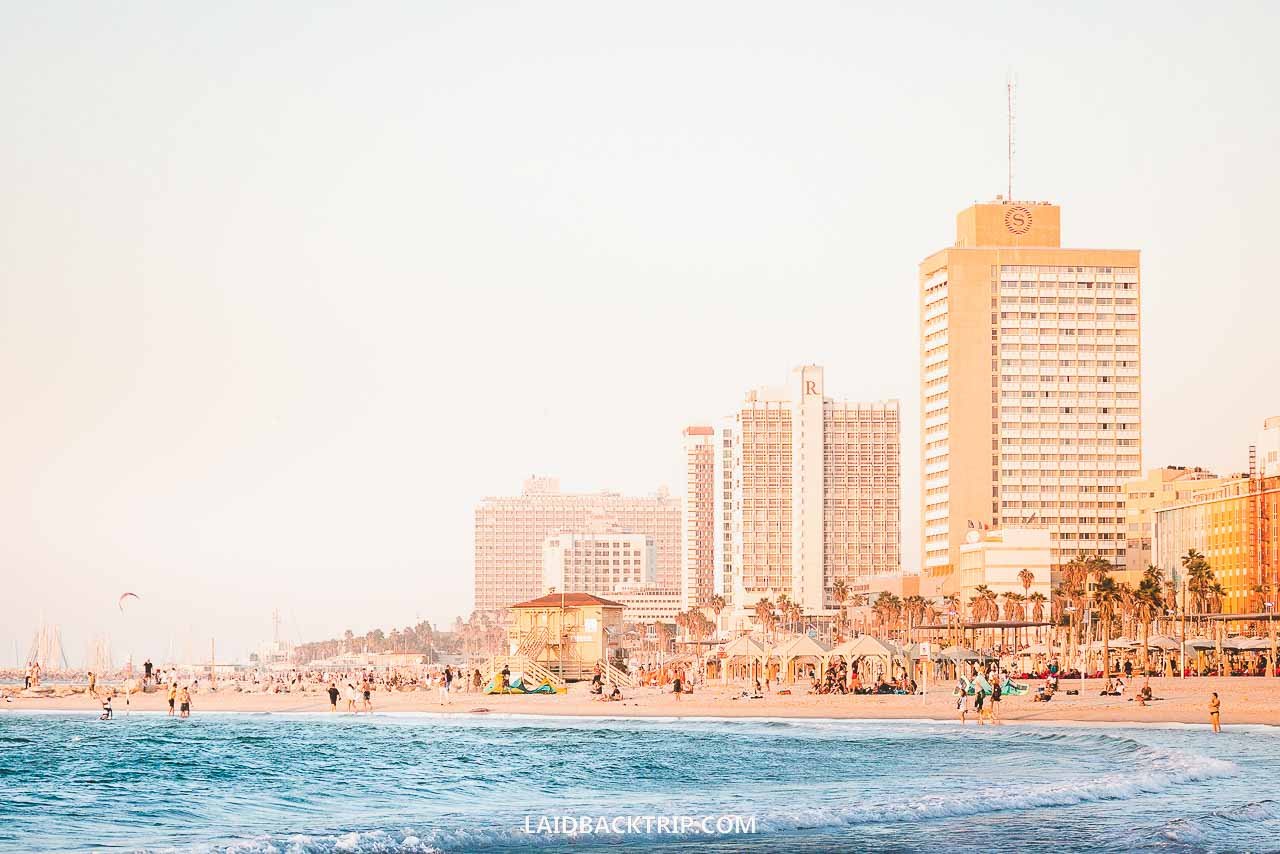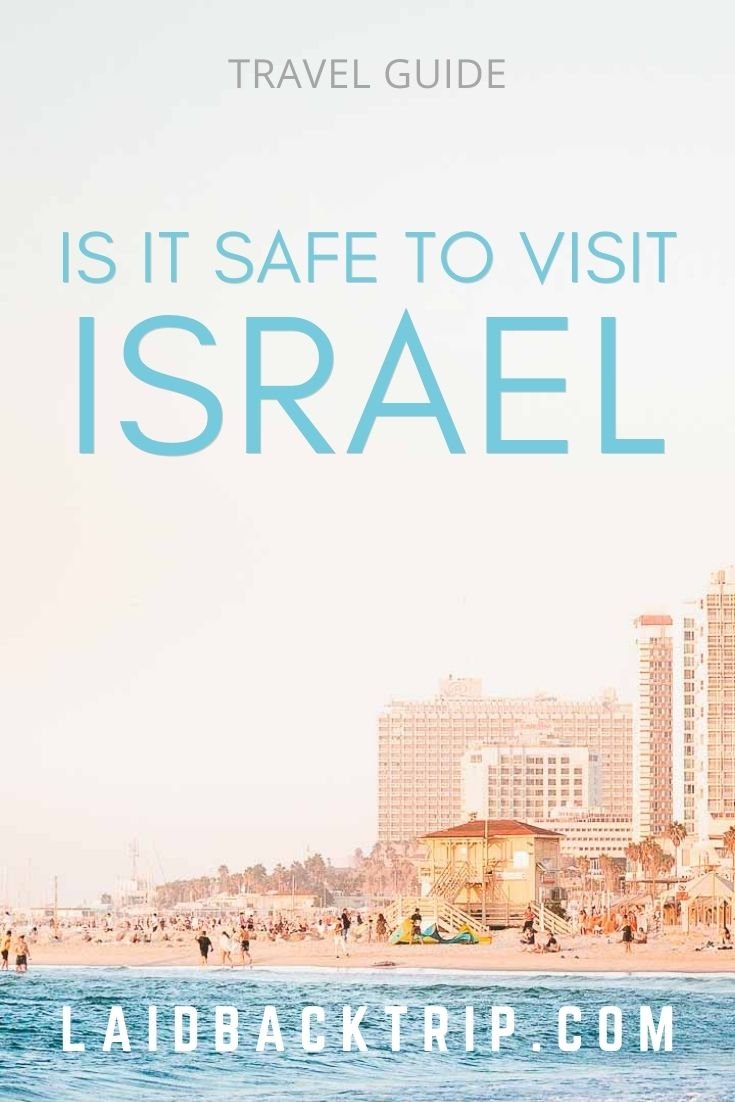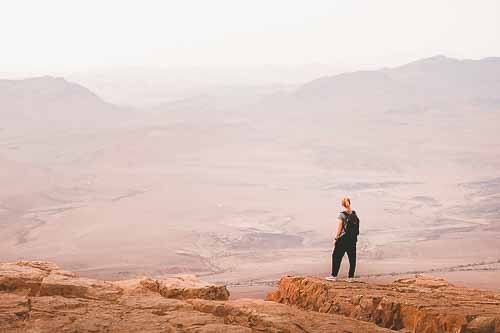Is It Safe to Visit Israel?
Is Israel safe to visit right now? What places and destinations are safe or dangerous in the Holy Land? Read our travel guide that includes our personal experience on safety in Israel from our recent trip to find out more.
Some countries are considered safe for traveling, while others are perceived as dangerous.
According to most foreign governments and surveys, Israel is not exactly the safest country for traveling in the world.
And the media that love sensationalism are often depicting Israel as a country that's always in some sort of conflict.
Protests, clashes, airstrikes, military conflicts, shootings, stabbings, and more.
The public image of Israel will obviously raise some serious security questions for every person who is about to visit this wonderful country for the first time.
Due to its turbulent modern-day history that started at the beginning of the 20th century, Israel is sitting in a difficult position.
And the fact that ancient history is even more complicated doesn't help the current situation at all.
After our recent 2-week Israel trip, we might be able to answer some of your most burning questions on whether Israel is safe to travel to or not.
So, is Israel a country you should avoid, or is the reality not that bad? Let's find out.
Is Israel a Safe Country to Visit?
Last Update 13.10.2023 - Due to recent tragic events, the U.S. Bureau of Consular Affairs recommends reconsidering travel to Israel and the West Bank and basically advises avoiding all non-essential travel to Israel right now. Always check travel warnings and advisories issued by your government before you go!
In general, Israel is a safe country to visit. Moreover, most of the locals will tell you there is not much to worry about, and it's perfectly fine to visit Israel (during the quiet times).
But we all know that the locals usually look at some things from a very different perspective than tourists.
A more pragmatic response would be, "It depends."
We'll start with the good news. We have to admit that we were really surprised by how safe we felt during our entire Israel trip.
To illustrate our feelings, we have to make a quick comparison.
As you probably know, we are from the Czech Republic. Some of our latest trips included Iceland and Ireland.
All three countries are often ranked as one of the safest in the world, a fact that we can only confirm.
Surprisingly, we have to say that we felt probably equally safe in Israel. That's something we didn't expect, and it really changed our perception of Israel.
What's the bad news?
The security warnings that include terrorism, civil unrest, and armed conflict issued by every state's government travel agency are not unfounded.
And even though our personal experience was great, there are simply times and situations making Israel not safe to visit.
Is It Safe to Travel to Israel Right Now?
One of the most common questions, if not the most frequently asked, about this country is whether Israel is safe right now.
Quite frankly, this will probably be the first question that most people will ask before they even start thinking about planning their trip to Israel.
For starters, now is a very loose term. The situation changes every day and may deteriorate in a matter of seconds.
Morevoer, no one can guarantee that nothing will happen in Israel during your visit.
No matter how much advice, warnings, and safety tips you read, no country is 100% safe.
But that's true regardless of whether you travel to New Zealand, Colombia, or Israel.
Most travelers also don't have the luxury to make spontaneous trips after following the security situation for several weeks or months, meaning that the chances you book your flight tickets in advance are high.
And a lot of things can happen meanwhile. And we understand that having concerns about the upcoming trip is not great.
Every cloud has a silver lining, though.
If you start noticing that something is going on in Israel, let's say two, three, or five weeks before your trip, chances are that the situation will be completely different by the time you arrive there.
Most of the time, the situation will calm down, and you won't be able to tell that something happened a week ago.
Travel Warnings vs. Reality
Before we booked the flights, we checked the current travel warnings issued by several states, such as the U.S., Canada, the U.K., and Australia.
They all contained very similar, if not identical, warning of risk levels.
Israel, the West Bank, and Gaza Strip - Exercise a high degree of caution as the security situation may change rapidly.
The information we found included that you should avoid all travel to the Gaza Strip and the border with the Gaza Strip, avoid non-essential travel to the West Bank, excluding Ramallah, Jericho, and Bethlehem, avoid all travel east of Road 98 near Syria, and avoid all travel to the border with Lebanon, and Egypt, excluding Eilat.
It also advised that you should exercise caution in East Jerusalem and parts of Jerusalem's Old City due to protests and clashes.
While the government's warnings usually sound more serious than the reality, these security recommendations seemed pretty accurate in this case.
Of course, we might argue that the places we visited ourselves in Israel were super safe during our trip, but that doesn't mean that something could not have happened.
Also, it seems that they don't change very often.
Still, always make sure to visit your state's Ministry of Foreign Affairs website to find the most up-to-date information before you go.
What Places are Safe to Visit in Israel
As a rule of thumb, some places are safer than others in the Holy Land.
However, there is not a definitive list of safe and unsafe traditional tourist destinations in Israel.
Popular places such as Jerusalem, Tel Aviv, Nazareth, Akko, Haifa, Safed, Beer Sheva, Ein Bokek, or Eilat are most of the time safe to visit.
There are also some exceptions as some popular attractions are located close to areas you should avoid.
For example, we had an opportunity to visit the Rosh HaNikra. These limestone sea caves lie directly on the Israeli Lebanese border.
And even though the road literally ends there, this is a regular tourist attraction that hundreds of people visit daily.
In the northeast of Israel, Nimrod Fortress, Tel Dan, and Hermon Stream are sandwiched between Lebanon and Syria, only a few kilometers from the borders.
All these places were very peaceful, and we felt really safe there.
The Red Canyon near Eilat was also safe for visiting, despite being near the fenced-off Israel-Egyptian border.
Of course, many locals will tell you that the entire Road 90 in the West Bank connecting the Dead Sea with the Sea of Galilee is also safe, together with plenty of other places in this territory.
West Bank and Gaza
Formerly known as the Palestinian territories, West Bank and Gaza are the most controversial areas in Israel.
Gaza is controlled by Hezbollah and is off limits for tourists. Therefore, there is not much to say or write about this territory in this regard.
West Bank can be visited with a guided tour and even independently, and it is relatively safe to visit.
Buses frequently leave from East Jerusalem to popular cities such as Ramallah, Bethlehem, Hebron, or Nablus.
Still, if you're visiting Israel for the first time, taking a guided tour to West Bank is definitely safer.
Not only will you feel safer, but the local and knowledgeable guides will allow you to understand better the area, history, conflict, and people.
Israeli citizens can't enter Area A, but tourists can. For instance, we've been to Jericho, home to the world's oldest settlement.
The difficult relationship between Israel and West Bank is often the source of a negative security image of this area, but some places are perfectly fine to visit.
Travel Insurance
One of the main reasons why you should always check the travel warnings your government issues is connected with the travel insurance.
Insurance companies don't want to insure travelers visiting dangerous countries or some dangerous areas inside these countries.
In Israel, this is mostly true of some West Bank areas.
Always use common sense. Stay safe. And always have good travel insurance.
We never leave home without travel insurance that was designed to cover our expenses if something goes wrong during the trip.
Travel insurance protects against theft, flight delays, injury, illness, cancellations, and much more.
World Nomads provides travel insurance for travelers to cover their trip essentials, including sports and adventure activities.
SafetyWing is affordable travel insurance for backpackers, long-term travelers, and digital nomads.
Travel smarter and safer!
Conflicts
Before we traveled to Israel, we followed the local news several months prior to the trip.
We planned the trip for the autumn, but we couldn't fail to ignore what was happening in the spring.
In May 2021, another Israel-Palestine crisis broke out.
The tragic news broadcasted by every major television network reached pretty much every corner of Earth almost instantly.
And we had no idea what would happen next or when they would resolve the current conflict.
While these problems are nothing compared to people losing homes, lives, or families, it certainly makes the planning part more difficult for someone who's about to visit Israel for the first time.
In this blog post, we'll stay focused only on the tourist side of this topic and try our best to look at this issue only from a tourist point of view, as we're no politicians.
While this conflict lasted in the end "only fifteen days," it still could seriously affect your travel plans.
Traveling during this period might be not only unsafe but also very stressful, not only for you but also for your family back home.
Being mentally prepared for postponing or canceling the trip at the last minute is something that will allow you to remain calm and stress-free when you're still at your home.
Unfortunately, even after several years of quiet, the conflict can explode at pretty much any time in Israel.
And even though some parts of the country remain untouched, it is still the news you do not want to hear about your next vacation destination.
Protests
Some of the travel advice is often very obvious, but it never hurts to remind ourselves of even the most basic rules from time to time.
Do not attend any demonstrations or protests. It's simple as that.
If you accidentally come close to any potentially dangerous situation, try to leave as quickly as possible.
People get hurt or, worse, killed during the protests. Remember that this is your vacation, and you should never let your curiosity overcome you.
It's not worth it. It's not safe.
Pickpockets
Although the level of street crime is very low in Israel, it's always better to be safe than sorry.
When visiting crowded places such as Carmel Market in Tel Aviv, Souk in Akko, or Via Dolorosa in Jerusalem, always watch out for pickpockets.
Simply put, this is just generic advice that's valid for every country in the world.
Shelters
Rockets can be launched from the Gaza Strip at Israeli cities during the crisis.
Israel is protected against missile strikes by the Iron Dome, but even though this defense system is extremely good, it's not 100% efficient.
Modern buildings have units with safe rooms, while the old ones usually have access to a shelter on the ground floor or basement.
When the sirens go off, try to remain calm and not panic. You don't want to get accidentally hurt when frantically looking for a place to hide.
You usually have only fifteen to thirty seconds to find a cover, so the chances of finding a nearby shelter are not great.
Therefore, it's recommended to walk into the nearest building and take cover there.
As a tourist, follow the locals. They know what to do and where to go in these situations and will help you.
Minefields
The area between Israel and Syria that is known as the Golan Heights makes a perfect natural barrier.
Due to the ongoing conflict between these countries, the strip that creates the border is an area full of minefields.
While you should always avoid traveling to this area, it's just a reminder that there are more dangers places in Israel.
Weather
One of the most overlooked dangers in Israel is the extreme weather conditions during the summer (and even winter).
When we were doing research on when is the best time to visit Israel, we realized a few things.
For starters, after seeing the average summer temperatures in top Israeli destinations such as the Dead Sea, Sea of Galilee, or Negev Desert, we instantly ruled out this period for traveling.
While the hundreds of sunshine and no rainy days might make a compelling case for a visit, it's simply not worth it, at least in our opinion.
Daily highs exceeding 40 Celsius is something that can turn your trip into a miserable experience.
Doing any sort of activity in these temperatures is simply not great for the human body.
Moreover, the popular Snake Path Trail to Masada can be closed if the temperature at a certain time exceeds a specified limit.
Winter is actually a good time to visit Israel if you want to avoid crowds or spend less on accommodation.
Still, the rainy days in the desert can cause extremely dangerous flash floods making some areas not safe to visit.
At times, snow can make driving challenging as well.
Getting Around
There are plenty of ways to get around Israel. In our opinion, one of the best ways to see Israel is on a road trip.
Fortunately, driving in Israel is very safe and having your own car allows you to get the most out of your trip.
And compared to driving in Jordan at night, we didn't find getting around the country by car difficult even after dark.
Simply put, driving in Israel is as safe as it can be.
While you might be tempted to rent a car in Israel and explore West Bank, don't forget that Israeli vehicles are not allowed into Area A.
There are huge red signs on the roadside (also in English) warning before entering these zones.
It doesn't mean that some places such as Jericho are not safe to visit for tourists. It's just not safe to do so by a car with an Israeli license plate.
Public transport is safe and reliable in Israel, making it a great alternative for those who don't want to drive or are visiting Israel on a budget.
Once again, whether you take a train or bus, public transport should be safe as it gets.
Staying Safe in Israel
Israel is not some war zone where you would be in constant danger.
It's actually a very safe country to visit most of the time.
In our opinion, the biggest problem is that some of the incidents happen without any sign of warning. It can be summed up as being at the wrong place at the wrong time.
For instance, we stayed in Jerusalem for four days, and it was one of the most peaceful places we've visited.
However, after a week, when we were already back home, there were two separate incidents in the Old City.
Both attacks happened on the Jerusalem streets accessible to the public. After the second attack, which left one person dead and four injured, the Temple Mount near the Western Wall was closed off.
Therefore, we strongly recommend you to follow the local news or social media.
Knowing what's happening in the country or the current mood and atmosphere right now will help you stay safe during your trip.
Times of Israel, Jerusalem Post, Israel Hayom, Haaretz, and Twitter are good sources to stay up to date on what's happening in the country.
The best part about the Israeli news we've mentioned above is that they're all in English, which makes the process of gathering information on the current status easier than ever.
A few months later, there was a series of mass shootings in Tel Aviv.
I noticed that Google Maps had a warning on their app, pinpointing the approximate locations of the incidents.
This seemed like a super helpful feature as it allows you to see what location you should avoid.
Unfortunately, no one can predict the future, but there are sources that can help you with the current one.
So, how should we conclude this blog post?
Israel is one of the most incredible and fascinating countries we've ever visited. And it would be a shame to avoid it just because of its public image.
Use your common sense. Be aware of what's going on. Stay safe.
Travel Resources
Here you can find links to all the travel resources we use and which you might find helpful when planning your next holiday.
Accommodation: When looking for accommodation, we usually search hotels via Booking.com or Hostelworld.
Tours: Although we love to travel independently, some places are better to visit with a guided tour.
We prefer GetYourGuide for its easy-to-use interface and solid reputation. Another great alternative is Viator.
Rental Cars: When going on a road trip, we always use Rentalcars.com, a reliable site for booking a rental car in advance.
Flight Tickets: When looking for flight tickets, you can search Skyscanner to find the best price.
Travel Insurance: World Nomads and SafetyWing cover against risks of travel.












